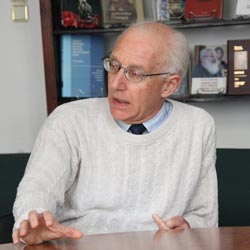The Contradiction of Secular Liberalism

 A secular society is no guarantee of LGBT rights….as secularism is enforced, liberalism vanishes.
A secular society is no guarantee of LGBT rights….as secularism is enforced, liberalism vanishes.
A recent incident in Lviv in which an LGBT activist was harassed by members of a right-wing political party prompted “Krytyka” editor Oleg Kotsyuba to pen a dramatic appeal in his blogin defense of human rights and liberal values. Tying the LGBT issue to the Maidan, the war in the Donbas, refugees, racism, and other matters of national and international importance, Mr. Kotsyuba arguesconvincingly that everyone has an interest in protecting the rights of sexual minorities (Krytyka, 21 March 2016).
What is striking about hisappeal is its advocacy of secularism – even though the activist’s persecutors did not represent any religious group. Besides, it is well known that Ukraine is a secular state. But the editor ties the “discourse of hatred” in Ukrainian society to the revival of “traditional values.” He is thus offended by a policeman’s “absurd” reference to biblical sources in discussing contemporary social issues. In Kotsyuba’s opinion, such matters should instead be decided according to “science” and “the facts of history.” It is ironic that in the very next sentence,the proponent of such atypically nineteenth-century materialist view speaks disparagingly of “the stage of development of our society at which we find ourselves.” Indeed, ifhis attitude is any indication, then Ukraine’s liberal intelligentsia lags far behind the twenty-first century, where the importance of religious perspectives in political, socio-economic, and cultural life has come to beunderstood in all advanced societies. Be that as it may, Mr. Kotsyuba is convinced that LGBT rights are not safe unless society -- and not just the state -- becomesthoroughly secular.
On the face of it, this appears true. The three Abrahamic religions generally condemn homosexual conduct. Even where the state is secular, a Jewish, Christian, or Muslim society is likely to treat members of the LGBT community differently from other citizens. Hence, it seems, only a secular society can guarantee their equality,or even their safety.
But would it necessarily do so? Let us look at two twentieth-century societies which largely succeeded in removing the influence of religion. Both did so by substituting a competing ideology. In post-Weimar Germany, it was the Nazi ideology. In the former Russian empire, it was Communism. Both the Nazi and the Communist regimes condemned homosexuality, and the Nazis persecuted homosexuals violently. Neither the atheistic Soviet state nor the thoroughly secularized Soviet society was friendly to homosexuals. Hence, a secular society is no guarantee of LGBT rights.
Could a religious society (given either a theocratic or a secular state) tolerate the LGBT community? It depends on the religion, and on the nature of the society. Militant Islam takes a dim view of homosexuals, as did, say, Puritan Boston. But current Catholic thought advocates charity for the individual along with condemnation of his sin, and opposes unjust discriminatory treatment. For homosexuals in a modern Catholic society, this means tolerance and protection, though not equality in all respects. But today, it is true, tolerance for homosexuals is largely to be found in highly secularized societies, such as those of northern and western Europe.
In those societies, the Christian ethic has largely been replaced with secular liberalism, which not only permits all “victimless” sexual conduct, but enshrines same-sex unions in the law. Secular liberalism has in fact become the ideology of both state and society in those countries. Consequently, other world views are relegated to minority status. In some cases, conflicts between official secular liberalism and religion are resolved in favor of the former. Thus, for example, Catholic charitable institutions may be required to provide or finance contraception for their employees, orEvangelical businesses may be compelled to provide services to same-sex couples.
A state (or a society, acting through the state) which compels members of religious groups to act in violation of their conscience is hardly behaving in a just or equitable manner. In the secular liberal state, freedom of conscience is in fact limited – indeed, sometimes violated. This may be of little concern to LGBT activists once their ideology has been enshrined in law. But for secular liberals, it constitutes an inherent contradiction:as secularism is enforced, liberalism vanishes.










